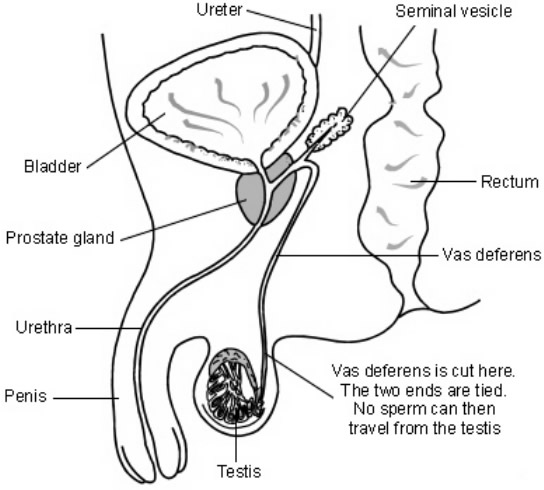Does Vasectomy Prevent Prostate Cancer?
One of effective methods for birth control in men is vasectomy. It is cheap, easier, quicker, and permanent. Even this practical contraception can work better than female sterilization. The term sterilization means if you decide to not have further children. But one of controversial issue, it might be linked to prostate cancer.
It is a small operation to cut and modify the tube that carries sperm from the testicles to the male genital organ. This tube is called vas deferens. See the picture below (credit to patient.co.uk)!
Sperm for fertilization with female mature egg is made in the testicles. Once this tube is cut, there will be no any sperm that come out with semen during intercourse. This is practical option for birth control.
How is it done?
Typically, you need to do it with anesthetic, at least with local anesthetic. However, sometime general anesthetic may be used to perform vasectomy.
Then your specialist will make a small cut where your vas deferens can be seen easily. To cut vas deferens, the specialist uses diathermy (mostly) or surgical knife.
Diathermy is an electrical device; it can make a small cut and prevent bleeding at the same time. If the cut is sewn, your specialist will only use dissolvable stitches.
The small operation for vasectomy is easy and fast. In general, it can take about 15 minutes.
Does it work effectively?
It is not only simple but also reliable, though it is not quite 100 percent.
About 1 out of 1,000 individuals with a successful operation of vasectomy will regain the fertility at some point in the future. In rare case, there is a small chance for 2 ends of the tube (vas deferens) re-joint over time.
How do you know that your vasectomy has worked?
A few days or weeks after taking vasectomy, you are still fertile. There may be some sperm left in the upstream of the tube.
To make sure it has worked, about one or two months after operation, your semen sample will be closely analyzed under microscope to check the existence of sperm. If there is no sperm, the operation works successfully.
What are the side effects?
A few days after taking the operation, you may feel some discomforts, but typically these will go away quickly. The use of tight-fighting underpants may help for coping. And for about a week after operation, you should not do any heavy physical activity!
 In general, there is no serious side effect from vasectomy. But in rare cases, some problems may occur, these include:
In general, there is no serious side effect from vasectomy. But in rare cases, some problems may occur, these include:
- Like most things in surgery, there is a chance of developing infection in the cut of the skin.
- Bruising around the area of surgery, but typically it improves in a few days.
- Dull ache around the scrotum.
- In very rare cases, sperm may leak – typically it leaks into the scrotum. This may cause a swelling and you may need treatment to resolve it.
- A small risk related to anesthetic!
Vasectomy doesn’t affect the way of your intercourse. But remember that it is permanent birth control. If someday you want to stop your vasectomy and want to regain your male fertility, there are some procedures to reverse it, but two ends of vas deferens are very difficult to be re-united.
The link between vasectomy and prostate cancer is not fully understood yet. Some studies have observed this issue, but there is still no clearly answer.
What are the results of these studies? The answer varies. While a few studies found that vasectomy might increase the risk of prostate cancer, most studies found no any connection. And there is also no clearly answer whether it can be a part of preventive steps to prevent cancer of prostate.
According to a new study released in the Journal of Clinical Oncology (July 2014), men who take this kind of birth control might have increased risk of developing aggressive prostate cancer. Fortunately, if it does have an effect, the risk is very small – and this finding is still debatable, too!
So in general, there is still no strong evidence to confirm the link. And for most men, taking vasectomy is currently considered safe. But if you do concern about your risk of prostate cancer, talk to your doctor!
Though there is no preventive step that can guarantee you are free of prostate cancer attack, but the following approaches have been confirmed can help reduce the risk of developing this cancer.




